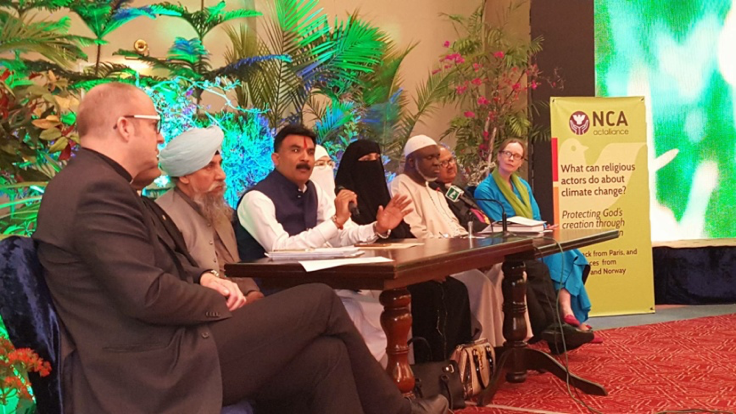Faith leaders on Climate Change in Pakistan
By: Einar Tjelle (CEESP member)
An important event took place in Islamabad the 10th of March. Leaders from World Council on Religions, Pakistan, and Norwegian Church Aid (NCA), facilitated a one-day conference in Islamabad about climate change and interfaith dialogue. A group from The Norwegian Interfaith Climate Network was invited to share our experiences.
The well attended seminar was titled “What can religious actors do about climate change? Protecting God’s creation through interfaith action”. The hosts emphasized worsened climate impact in Pakistan, and the urgent need for religious actors to be more involved in the following up of the Paris-Agreement.

Photo: Ingrid Næss-Holm, NCA.
The Secretary Ministry of Climate Change Syed Abu Ahmad Akif said: “God created the world in balance. But humans have disturbed that balance out of greed”. He suggested that religious leaders should preach about climate change, environment and conservation at least once a month, and that religious leaders could influence people to put more emphasis on the issues. Maulana Tahir Ashrafi, central chairman of the Pakistan Ulema Council, the country's council of religious scholars, said:”Imams in Pakistan could have unprecedented influence in bringing action on climate change. But first, they need training to both understand and communicate the issues accurately in a country hard-hit by climate-related drought, flooding, crop losses and other problem”.
“It is our duty to be good stewards of God Allah’s creation”, said Professor Charles Amjad of Luther Seminary in St. Paul, USA. “It is also our duty to realize that when climate change affects people through floods and disasters, they hit the poorest of the poor hardest. This is a fact and we must do our utmost to avoid suffering”, he said.
Imam Ibrahim Saidy, Daru Salam Islamic Centre, Oslo, said that the religious organizations the last years had played a key role internationally, for a holistic discussion on climate change issues. “I think we were the first country having an interfaith delegation do the UN Climate Summits”, he said. Saidy is originally from The Gambia but has lived in Norway for about twenty years and is a naturalized citizen by now. Saidy took also part in the IUCN side-event the first day of COP21 in Paris.
“It was fascinating to attend the conference”, said a local NGO participant. “I am used to listing environmentalists and other specialists talking about these issues, often from technical viewpoints. This time the moral and ethical aspects were emphasized, which added a deeper justification and understanding”, she said.
In my presentation I encouraged people of faith to challenge political leaders. We must ask our political leaders to really follow up the commitments from the Paris-Agreement, and take brave decisions for our future generations. Gethering religious leaders together with politicians, scientists and NGO-representatives like this event in Islamabad did, is very important. We need also more of interfaith sharing of experiences and strategies across the borders, related to climate change.
Rev. Einar Tjelle, Deputy General Secretary, Church of Norway. Head of Norwegian Interfaith Climate Network. Member of IUCN-CEESP Specialist Group on Religion, Spirituality, Environmental Conservation and Climate Justice (ReSpECC)
